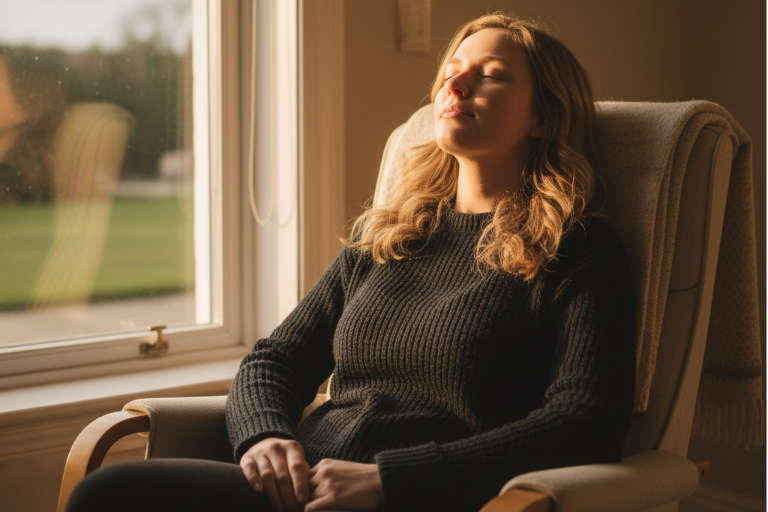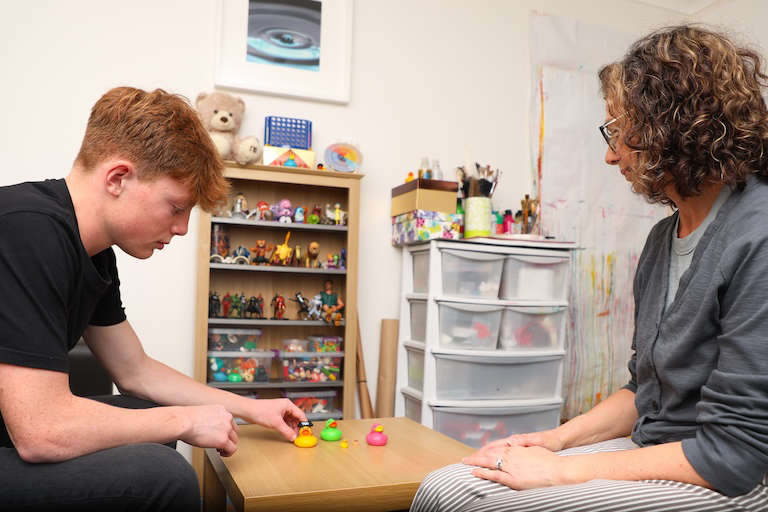The Power of Pausing
In a world that constantly demands movement and achievement, pausing can feel almost impossible. Yet in healing from trauma, and in life itself, the act of slowing down is often where the deepest shifts begin.
Pausing is not about giving up or standing still forever. It is about creating a moment where you no longer have to fight, perform, or explain. It is a gentle breath between what was and what comes next, a chance for your body and mind to remember that safety is possible.
Perhaps you know this feeling already: lying in bed exhausted yet unable to rest, or rushing from one task to the next without catching your breath.

When trauma or anxiety has trained your body to stay on alert, the simple act of pausing can feel like the hardest thing in the world. For many people, this is part of healing from trauma, learning to rest without fear.
Why Pausing Can Feel Unsafe After Trauma
When we pause, the nervous system has space to settle. Muscles unclench, breathing steadies, and the background noise of worry softens. In these small moments, the body learns that it does not have to stay on high alert all the time.
Research has shown that pausing, even briefly, can activate the parasympathetic nervous system, which helps lower stress hormones and signals the body that it is safe to rest. These tiny shifts are part of the deeper process of emotional healing and of healing from trauma in daily life.
But if you have lived through trauma, pausing is not always simple. Stillness can feel unbearable, because your body has learned that being on guard is what keeps you safe. This is not a failure, it is a sign of how hard your system has worked to protect you.
“There is nothing broken in you, only parts of you that learned to keep you safe when life felt too much.”
As I often remind clients, “There is nothing broken in you, only parts of you that learned to keep you safe when life felt too much.” In therapy, we honour those parts. We do not rush the pause. Instead, we move slowly, introducing moments of stillness at a pace that feels safe, so your nervous system learns resilience rather than fear.
What Pausing Looks Like in the Process of Healing
Every person’s journey is unique, but pausing often shows up in small, powerful ways.
One client once told me that silence in a conversation always felt terrifying. It reminded her of being ignored as a child, left wondering what she had done wrong. In our sessions, we began by introducing very small pauses together, a quiet breath before she spoke, or a few moments of stillness while she placed her hand on her chest. Over time, those pauses no longer felt like rejection. They became moments of presence, reminders that she was safe enough to stop performing.
Another client noticed the power of pausing outside therapy. During an argument with her partner, instead of reacting instantly, she took a breath before replying. That pause gave her the space to respond with clarity rather than fear. Later she told me, “It was the first time I felt like I had a choice instead of just exploding.” These small discoveries are the building blocks of healing from trauma.
This is the gentle power of pausing. It turns what once felt dangerous into a source of steadiness and becomes one of the most valuable tools in healing from trauma.
Gentle Steps Towards Pausing
There are small ways we can begin to practise pausing in therapy and in daily life:
- Allowing silences in therapy where you do not have to fill the space
These moments often surprise clients by showing that silence can feel supportive rather than rejecting. - Taking a breath together before exploring something painful
Even one slow breath can soften the body’s defences and remind you that you are not alone. - Practising grounding, noticing your body and surroundings in the here and now
Simple acts like feeling your feet on the floor or noticing the texture of an object can signal safety to the nervous system. - Introducing moments of rest between tasks or conversations in daily life
Pausing for a cup of tea or a few minutes outside helps your body learn that rest is allowed, even in small doses. - Exploring what makes stillness feel unsafe, at your own pace and never alone
When fear arises, we meet it gently and with compassion, so your protective parts feel acknowledged rather than pushed aside.
These steps are not a checklist. They are a soft map, always leading towards greater steadiness, safety, and trust in your own rhythms. Over time, they form part of the larger process of healing from trauma.
The Change That Becomes Possible
When pausing begins to feel safer, the benefits ripple through daily life. The nervous system learns that it can rest without danger. Anxiety quiets enough for you to breathe more fully, to sleep more deeply, and to think more clearly.
Relationships become lighter and less reactive, because you are no longer always braced for the next blow. Choices feel clearer, because you are able to respond instead of react. Clients often describe a new sense of spaciousness, like finally being able to step off the treadmill and rest in themselves.
Over time, pausing no longer feels like a threat. It becomes a tool for resilience, a way of gently reminding yourself that you are safe enough, here and now. Healing from trauma is not about erasing the past but about creating a new relationship with the present, one where rest and safety are possible again.
A Gentle Invitation
If life has felt like a constant demand to keep going, perhaps the bravest thing you can do is pause. Healing from trauma is not about rushing into stillness, but about discovering safety in moments of rest that grow stronger over time.
Even considering this is a courageous first step. Together, we will go slowly, introducing pauses at a pace that works for you. Over time, those pauses become less frightening and more like allies, helping you find balance, resilience, and a kinder way of being with yourself.
If you are ready, I would be honoured to walk alongside you as you discover the healing power of pausing.

